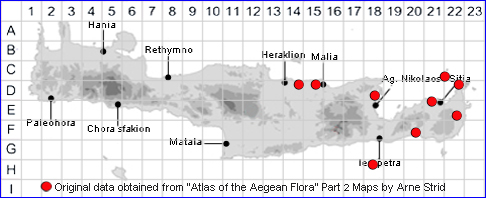
SPECIES DESCRIPTION
NIGELLA FUMARIIFOLIA
Family and Genus:- See- RANUNCULACEAE
Common Names:- None
Homotypic Synonyms:- None
Meaning:- Nigella (L) Blackish, (reference to the seed coats).
Fumariifolia (L) Resembling Fumaria leaves.
Stem:-
1) 4-12 cm long, few to several, spreading and ± prostrate,
Leaves:- .
1) Ultimate, lobes elliptic-ovate to oblong.
Flower:-
1) 16-22 mm in Æ.
2) Sepals, whitish, pale greenish or pale blue.
3) Limb, ovate, abruptly narrowed into a slender claw c. 1/3 as long as the limb.
4) Honey leaves, lower lip, lobes, gradually narrowed into a slender appendage,
reddish-purple.
5) Anthers, obtuse, without a mucro, crimson-purple.
Fruit:-
1) Follicles, united to 1/3, tuberculate-rugose in the lower 1/2, gradually narrowed
into the style, spreading horizontally in fruit to form a rigid star, ± indehiscent.
2) Seeds, ovoid or triquetrous.
Key features:-
1) Flowers, blue, greenish or reddish.
2) Anthers, not mucronate.
3) Flowers, without an involucre of leaves.
4) Stems procumbent.
5) Leaf-segments, small, ovate.
6) Follicles, united for 1/3 of their length.
7) Seeds, ovoid or triquetrous.
Habitat:- Dry open shrubby vegetation, fallow fields, grassy hills and coastal flats,
on limestone.0-100 m.
Distribution:- In Greece not recorded outside the Aegean area- - Fairly common in
Cyprus
Flowering time:- April-May.
Photos by:- Steve Lenton
